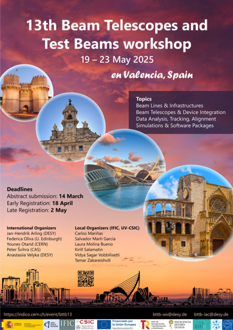Speaker
Description
Muon Spin Rotation (μSR) is a well-established technique in material science for probing magnetic properties at the atomic scale. Traditional scintillator-based μSR detectors are fundamentally limited in spatial resolution and event rate, restricting measurement precision. The utilization of ultra-thin silicon pixel sensors enables precise particle tracking, potentially revolutionizing μSR measurements.
To overcome these limitations, a pixel-based μSR spectrometer was developed and tested at the πE3 beamline at the Paul Scherrer Institute (PSI). The setup features a four-layer hodoscope with MuPix11 sensor modules, allowing for precise tracking of both incoming muons and outgoing decay positrons. The Corryvreckan framework is employed for full μSR event reconstruction, integrating advanced track selection algorithms to distinguish muons from positrons, accurately determine decay vertices, and perform high-resolution spin precession measurements.
The results demonstrate a significant improvement in the accepted event rate, enabling operation at beam rates up to 100 times higher than conventional μSR detectors, while achieving sub-millimeter spatial resolution for precise sample reconstruction and multi-sample applications.
